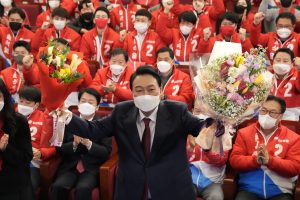Yoon Suk-yeol, the presidential candidate of the conservative People Power Party, won the presidential election on March 9. He edged out rival Lee Jae-myung from the Democratic Party by 0.7 percentage points, the narrowest margin of victory since the country adopted a direct presidential election system in 1987.
Based on the final results of the election reported by local media, Yoon won 48.56 percent of votes while Lee garnered 47.83 percent. Sim Sang-jung from the Justice Party received 2.37 percent of the votes.
Since the country started holding free presidential elections, progressives and conservatives have taken the presidency for two successive terms in turn (the current law allows the president to serve for a single five-year term). However, this formula broke down with Yoon’s victory.
Current South Korean President Moon Jae-in’s approval ratings have been hovering around 45 percent, which is high compared with his predecessors’ approval ratings in their final months in the presidency. In that sense, Moon is likely to be the first president who had no lame-duck period. However, with Yoon as his successor, the results of the election reflected Moon’s failure in governing domestic affairs for the past five years.
Compared with previous elections, yesterday’s election was particularly a battleground for Koreans in their 20s.
Based on the exit polls, voters in their 20s leaned toward different candidates: 58.7 percent of male voters in their 20s voted for Yoon while 58.0 percent of female voters voted for Lee. Young Korean were already clashing on social media over gender inequality issues when the main opposition party elected as its leader Lee Jun-seok, an emblematic young politician who has been standing against local feminism movements. Lee doubled down on his stance as a defender of young men by persuading Yoon to pledge to abolish the Ministry of Gender Equality and Family. Consequentially, this has driven a clear wedge between men and women in their 20s. Many young female voters chose to vote for Lee, not Sim, to block this initiative.
A day after the election, some officials of the People Power Party apologized for invoking such a gender divide during the election. However, Yoon has denied ever driving a wedge between men and women during the election. He is expected to carry through on his pledge to abolish the Ministry of Gender Equality and Family as it has been a hot potato not only for his supporters but also for the general public in the past few years. According to some polls, over half of South Koreans support scrapping the ministry, showing pervasive public discontent over the government’s gender equality efforts.
Skyrocketing housing prices in Seoul and the greater Seoul area also affected the results of the election.
Since Moon took office in 2017, the housing price issue in Seoul, the capital of South Korea, has been the Achilles’ heel of Moon’s Democratic Party. Housing prices have doubled in general – and in some areas prices have tripled – even as the Moon government adopted numerous measures and policies meant to stabilize prices.
The housing crisis eventually led a quarter of those who voted for Moon in the 2017 presidential election to switch parties and vote for Yoon, not Lee, in yesterday’s election. It also led to Yoon topping Lee by 5 points in Seoul, which was a critical factor in Yoon’s victory, considering the historically narrow margin separating the final tally.
As more than half of the total population lives in Seoul and the greater Seoul area – Gyeonggi Province and Incheon Metropolitan City – it was important for both parties to secure as much support as possible in those areas. As former governor of Gyeonggi Province and mayor of Seongnam City, Lee succeeded in winning more support in his home ground and Incheon Metropolitan City but failed to narrow the margins in Seoul, where antipathy among middle-class people over the housing prices has taken firm root.
Local polls have shown strong support among eligible voters for regime change since the Moon government failed to prevent the drastic rise in housing prices. For Lee, the result was not a shocking defeat but bitterness of the loss will linger as he showed an unexpectedly strong performance in the election.
In the end, the results of yesterday’s election explicitly showed how the country is divided by gender, generation, region, and ideology.
In his first message as president-elect, Yoon said he “will solely trust people and follow the will of the people.” Yoon also said his victory is a desperate appeal from the people for politics of unity, not division, and a vote for reform for the restoration of justice and common sense.
However, given the messages Yoon and his party have delivered during the campaigns, it will take a long time for Yoon to make his message compelling to young women, who were offended by his male-centered remarks on gender inequality.
In a five-minute congratulatory phone call with Yoon, Moon asked Yoon to pursue politics of “unity” and “harmony” to close the nation’s rifts. Yoon responded to the request with a positive attitude, saying he will not divide progressives and conservatives but set people’s interests as a top priority for his state affairs.
After the call with Moon, Yoon also had a phone call with U.S. President Joe Biden. Biden congratulated Yoon on his victory and expressed his expectations for close coordination with Yoon’s government.
Biden and Yoon have agreed to arrange an in-person meeting as quickly as possible after Yoon takes office in May.

































